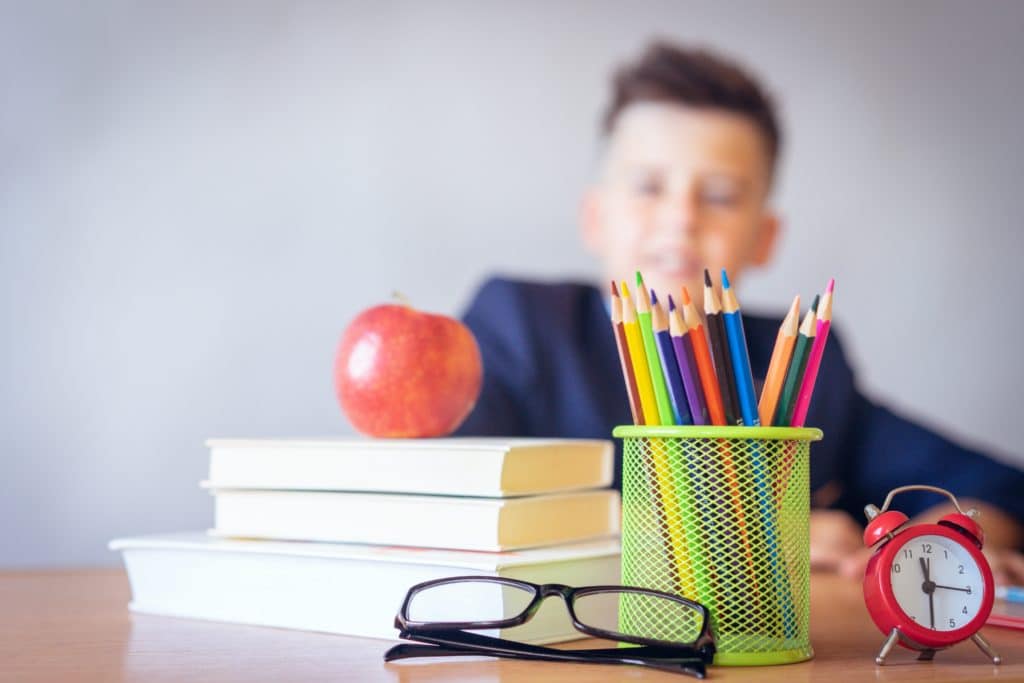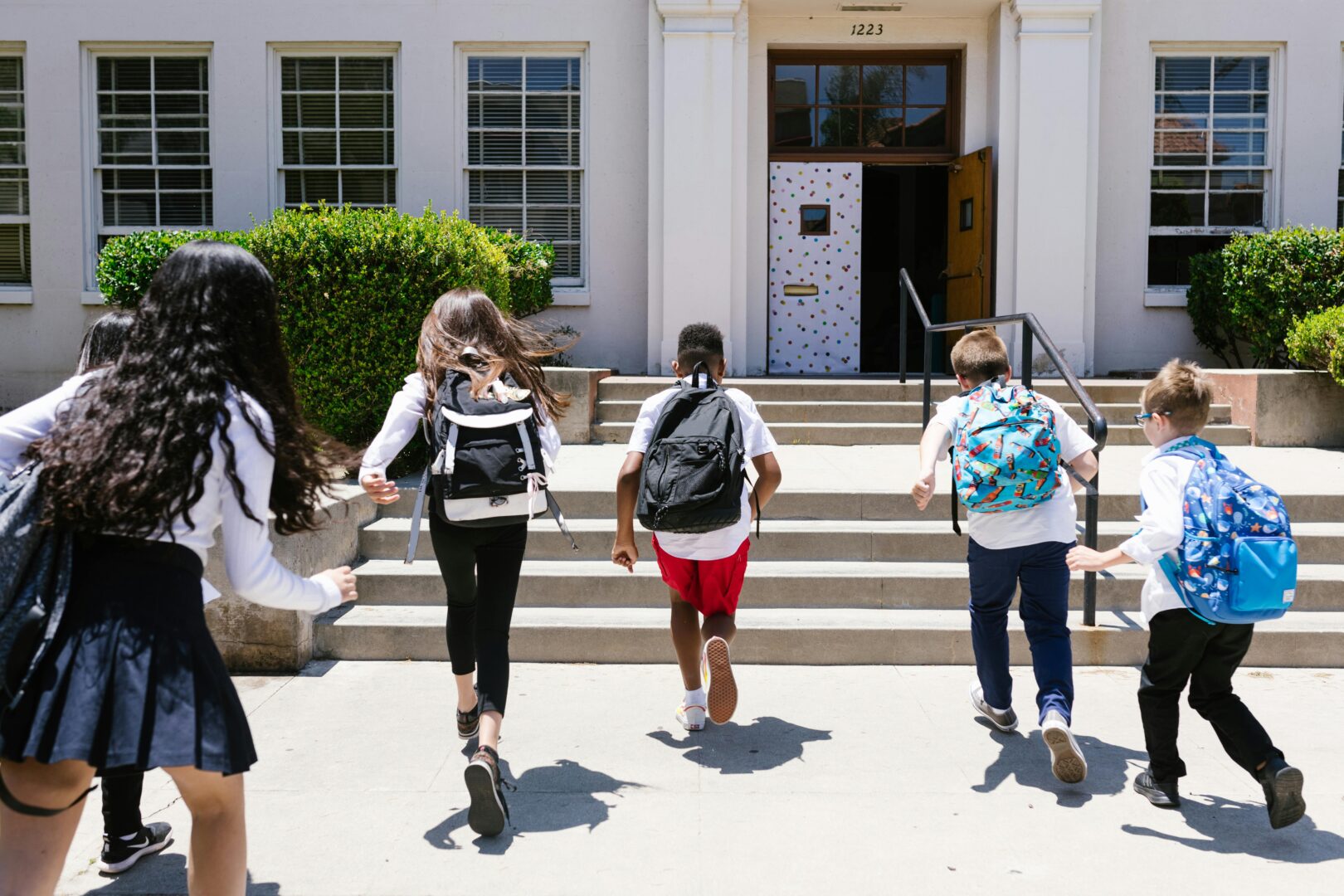Back-to-school season is an exciting time for our kids – new teachers, maybe a new school building and a chance to reconnect with friends they didn’t see over the summer! But for our children on the autism spectrum, and their families, back-to-school can bring a specific set of challenges.
For an autistic child, changes in routine, a new classroom environment, and the social demands of the school setting can feel overwhelming. And as a parent, you may feel a bit worried about how you can help your child navigate these transitions successfully.
The good news is that with a little planning, preparation, and consistent support, you can help your child feel confident, safe, and ready to thrive as the school year begins!
Here are five strategies families can use to support their autistic child during this back-to-school transition.
5 Strategies To Support A Smooth Back-To-School Transition
#1 Establish a Predictable Routine
Children on the autism spectrum often feel most secure and supported when their day follows a predictable routine. Sudden changes can cause stress or anxiety, so creating a consistent school day routine for you child is so important.
Why it helps: A consistent routine gives your child a sense of control and predictability, reducing overall anxiety and promoting more independence in their day.
Ways to create a predictable routine:
- Adjust sleep schedules gradually: Move bedtime and wake-up times closer to school-day routines in the weeks leading up to the first day.
- Plan daily routines: Include mealtimes, self-care, homework, and play so your child knows what to expect.
- Use visual schedules: Picture charts or apps can help your autistic child understand their daily flow.
- Practice school mornings: Do a run through of a typical school morning to build confidence.
#2 Practice Necessary Social & Communication Skills
We know that school is so much more than academics, our kids are learning and building important social skills as well. Many autistic children struggle with this aspect of the school day so practicing necessary and appropriate social and communication skills at home can be so helpful!
Why it helps: Building confidence in communication before school starts helps your autistic child feel more comfortable interacting with peers and teachers, reducing anxiety and frustration.
Ways to practice communication skills:
- Role-play school scenarios: Practice greetings, asking for help, or responding to questions.
- Encourage conversation skills: Work on taking turns, making requests, and answering open-ended questions.
- Use communication tools: If your child uses an AAC device or other supports, practice using it in everyday situations.
- Structured social practice: Small playdates or group activities can provide safe opportunities to practice interactions.
Tip: Speech therapy strategies can reinforce these skills at home, giving your autistic child extra confidence in social situations.
#3 Create Familiarity For The School Environment
For an autistic child, stepping into a new classroom, meeting a new teacher, or navigating a school building can easily become stressful. Creating some familiarity with the new environment can help your child feel ready for this new school year!
Why it helps: Familiarity reduces anxiety and allows children to practice necessary coping strategies and social skills.
Actionable tips:
- Visit the school: Walk through classrooms, hallways, and common areas to help your child feel comfortable.
- Meet teachers and staff: Early introductions reduce anxiety about asking for help.
- Practice transportation routines: Try a short bus ride or car drop-off to simulate the school-day routine.

#4 Know Your Child’s Sensory Supports & Best Coping Strategies
Many autistic children experience sensory sensitivities, which can make the school environment challenging and overwhelming. Have a clear plan and all necessary tools – noise cancelling headphones, fidgets, etc. – ready to go each school day.
Why it helps: Managing sensory challenges with a plan and tools allows your child to participate fully in class and feel more in control of their environment.
Ways to prep for sensory needs:
- Know your child’s sensory triggers: Notice sensitivities to noise, lighting, textures, or crowds and develop strategies to reduce stress.
- Provide preferred sensory tools: Fidget toys, noise-canceling headphones, or a small comfort item can help during overwhelming moments.
- Practice calming techniques: Simple strategies like deep breathing, guided imagery, or movement breaks can be practiced at home.
Tip: Occupational therapists can provide individualized sensory strategies to help your child thrive in school.
5. Collaborate with Teachers & Support Staff
Open communication between home and school ensures that your autistic child receives consistent support throughout their school day. Collaboration with teachers and school staff can make a huge difference in how comfortable and confident your child feels.
Why it helps: When teachers and staff fully understand your child’s unique needs, and when parents learn strategies to reinforce new skills at home, it creates a consistency that reduces anxiety and supports success.
Tips for parent/teacher collaboration:
- Share routines and triggers: Provide teachers with insights into your child’s daily routines, sensory sensitivities, and coping strategies.
- Request regular updates: Stay informed about academic progress, social interactions, and any challenges.
- Develop a home-school plan: Establish goals, accommodations, and supports that work both at home and school.
- Participate in meetings: Ensure educational accommodations address your autistic child’s strengths and challenges.
Back-to-school transitions can be challenging for lots of kids but for a child with autism, it can feel especially overwhelming. But with the right preparation and support, this exciting time of year can also be smooth and successful!
By establishing predictable routines, practicing communication skills, providing sensory support, and collaborating with teachers, you are setting your child up for a wonderful school year!
In addition, therapy support, including speech, occupational, and behavioral strategies, can play a really helpful role in making back-to-school transitions smoother and more manageable. At Beyond Speech Therapy Specialist, we provide this kind of one-to-one support as part of our in-home therapy and we’d love to partner with you to make this school year an amazing one!
Reach out today to learn more and connect with one of our therapists!
With a bit of preparation, practice, and encouragement, your child can start the new school year feeling ready to learn, grow, and thrive!

